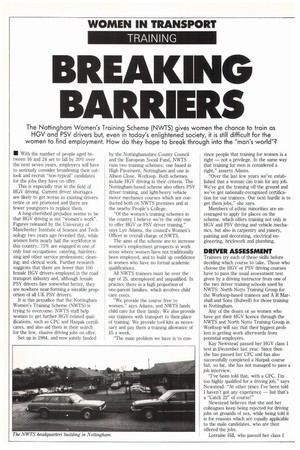BREAKING BARRIERS
Page 34

Page 35

If you've noticed an error in this article please click here to report it so we can fix it.
The Noitingham Women's Training Scheme (NWTS) gives women the chance to train as HGV and PSV drivers but, even in today's enlightened society, it is still difficult for the women to find employment. How do they hope to break through into the "man's world"?
• With the number of people aged between 16 and 24 set to fall by 20% over the next seven years, employers will have to seriously consider broadening their outlook and recruit "non-typical" candidates for the jobs they have on offer.
This is especially true in the field of HGV driving. Current driver shortages are likely to get worse as existing drivers retire or are promoted and there are fewer youngsters to replace them.
A long-cherished prejudice seems to be that HGV driving is not "women's work". Figures released by the University of Manchester Institute of Science and Technology two years ago revealed that, while women form nearly half the workforce in this country, 75% are engaged in one of only four occupations: catering, hairdressing and other service professions; cleaning; and clerical work. Further research suggests that there are fewer than 100 female HGV drivers employed in the road transport industry and, although female PSV drivers fare somewhat better, they are nowhere near forming a sizeable proportion of all UK PSV drivers.
It is this prejudice that the Nottingham Women's Training Scheme (NWTS) is trying to overcome. NWTS staff help women to get further HGV-related qualifications, such as CPC and Hazpak certificates, and also aid them in their search for the few, elusive driving jobs on offer.
Set up in 1984, and now jointly funded by the Nottinghamshire County Council and the European Social Fund, NWTS runs two training schemes: one based in High Pavement, Nottingham and one in Albion Close, Worksop. Both schemes include HGV driving in their criteria. The Nottingham-based scheme also offers PSV driver training, and light/heavy vehicle motor mechanics courses which are conducted both on NWTS premises and at the nearby People's College.
"Of the women's training schemes in the country I believe we're the only one to offer HGV or PSV driver training," says Lyn Adams, the council's Women's Officer in overall charge of NWTS.
The aims of the scheme are to increase women's employment prospects in work areas where women have not traditionally been employed, and to build up confidence in women who have no formal academic qualifications.
All NWTS trainees must be over the age of 25, unemployed and unqualified. In practice there is a high proportion of one-parent families, which involves child care costs.
"We provide the course free to women," says Adams, and NWTS funds child care for their family. We also provide our trainees with transport to their place of training. We provide tool kits as necessary and pay them a training allowance of a week.
"The main problem we have is to con
vince people that training for women is a right — not a privilege. In the same way that training for men is considered a right," asserts Adams.
"Over the last few years we've established that a woman can train for any job. We've got the training off the ground and we've got nationally-recognised certification for our trainees. Our next hurdle is to get them jobs," she says.
Members of ethnic minorities are encouraged to apply for places on the scheme, which offers training not only in HGV and PSV driving and vehicle mechanics, but also in carpentry and joinery, painting and decorating, electrical engineering, brickwork and plumbing.
DRIVER ASSESSMENT
Trainees try each of these skills before deciding which course to take. Those who choose the HGV or PSV driving courses have to pass the usual assessment test given by a driving instructor from one of the two driver training schools used by NWTS: North Notts Training Group for the Worksop-based trainees and A R Marshall and Sons (Bulwell) for those training in Nottingham.
Any of the dozen or so women who have got their HGV licence through the NWTS and North Notts Training Group in Worksop will say that their biggest problem is getting work afterwards from potential employers.
Kay Newstead passed her HGV class I test in December last year. Since then she has passed her CPC and has also successfully completed a Hazpak course but, so far, she has not managed to pass a job interview.
"I've been told that, with a CPC, I'm too highly qualified for a driving job," says Newstead. "At other times I've been told I haven't got any experience — but that's a "Catch 22" of course!"
Newstead believes that she and her colleagues keep being rejected for driving jobs on grounds of sex, while being told it is for reasons which are equally applicable to the male candidates, who are then offered the jobs.
Lorraine Hill, who passed her class I test at the end of June, also feels that rejection is based on prejudice — rather than more objective criteria.
"People can be very patronising when you apply for jobs," she comments.
Lyn Adams believes that employers' reservations revolve around a woman's lack of physical strength and possible difficulties arising from relationships with her (male) colleagues.
"Both of these are "non-arguments" — especially the physical strength one," says Adams. "After all, these days there's usually someone or something, like a forklift truck, to help any driver to unload."
There is a further argument against employing women as HGV drivers. This is that on long-distance journeys a woman sleeping in the cab is particularly vulnerable to attack. "Things can be unsafe for men in this position too, of course," says Adams. "We would rather concentrate on pointing out to employers the benefits of employing a woman as a driver.
"The skills that women have developed from running a household mean that they are good at looking after both their vehicle and its load. And, with their readiness to job-share with other women, they get the benefit of being able to work and have time with their family — and the employer gets two drivers for the price of one."
DRIVING AGENCIES
So far, history has not been kind to the NWTS. Of the 12 women trained as drivers by the North Notts Training Group for the NWTS, one is an ambulance driver, one is a driving instructor and the rest are registered with driving agencies and work only from time to time.
In Nottingham 21 women have been trained so far, by Marshalls of Bu!well. Of these, eight have been trained on HGVs and seven on PSV. Six have not stayed the course. All the PSV drivers have jobs, compared with four of the HGV holders.
There are 10 trainees based at Nottingham at the moment, six training as HGV drivers and four as PSV drivers.
"It is a middle-class myth to think that women have never worked," comments Adams: "Working class women have always worked. What we do is give them the chance to earn decent money by acquiring skills which are in demand. What we must do, though, is convince employers of the worth of employing women — particularly in jobs not traditionally associated with women."
With the predicted labour market crisis in the 1990s they might just succeed.
0 by Bryn Howell
Further information on the NWTS can be obtained from: Lyn Adams, Women's Officer, County Hall, West Bridgford, Nottingham (phone: (0602) 823823); Rose Ardron, NWTS, Albion Close, Worksop (phone: (0909) 474029); or Jenny Caitlin, NWTS, Shire Hall, High Pavement, Nottingham (phone: (0602) 586236).














































